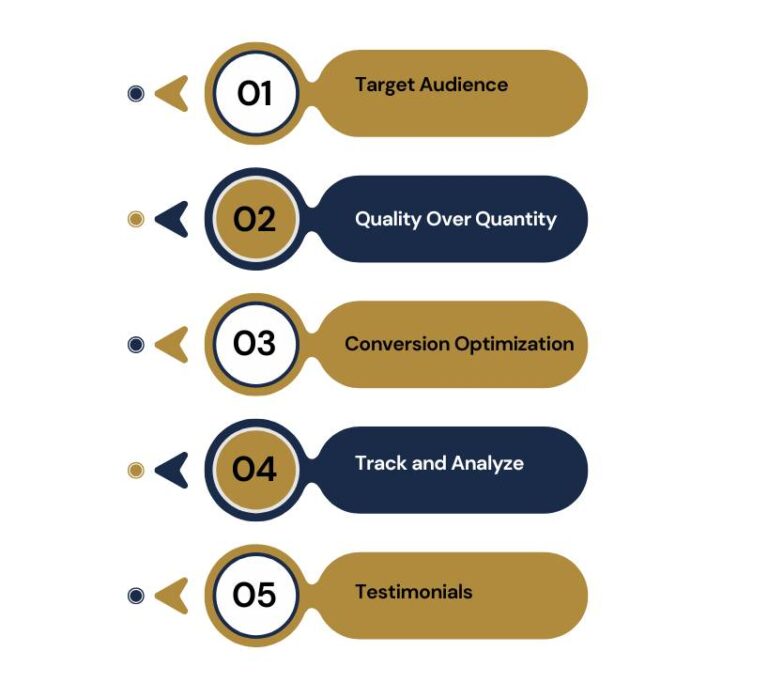The lead generation for law firms is a critical component of growing your practice to ensure long-term success. In a highly competitive legal market – attracting high-quality leads is key to expanding your client base. The effective strategies such as optimizing your website, utilizing SEO, running PPC campaigns, and leveraging client referrals will help law firms stand out and convert prospects into paying clients. Here’s how to build a successful lead-generation strategy for your firm.
What is Law Firm Lead Generation?
The law firm lead Generation refers to the procedure of attracting possible clients, leads to your law firm by different marketing methods. The objective behind this procedure is to guide the prospects toward various actions such as scheduling a consultation, asking more questions, or seeking your legal service.
Lead generation in law firms must use a combination of approaches specific to the legal industry to ensure leads generated meet the desired quality standards and fall within your practice areas.
Why is Lead Generation Important for Business Growth
The lead generation for law firms helps grow your client base, develop long-term relationships, and generate revenue. Without a flow of qualified leads, law firms are at risk of stagnation.
Lead generation delivers:
- Continuous flow of clients – Never allow your firm to go dry on potential clients.
- Brand Visibility – A competitive market needs to ensure the firm is highly visible.
- Revenue Growth – Converts qualified leads to paying clients and expands areas of practice
Investing in the right lead-generation strategies will ensure law firm enjoys sustainable growth as well as an undeniable grip on the market.

Lead Generation Strategies for Law Firms
Effective Lead Generation in Lawyers needs to be made using modern digital strategies in combination with traditional ones. Given below are some tips that work well for generating strong-quality leads
1. Optimize Your Website
A lead generation process starts from a simple well-optimized website. It needs to be easily navigable, mobile-friendly, and designed to drive conversion. Must have:
- Clear calls to action (CTAs) – A compelling call to action encourages visitors to book a consultation immediately.
- Lead capture forms – Use forms to capture lead information from prospective clients, such as name, email address, and legal issue.
- Contact information – Ensure your phone number and contact information are readily accessible on every page.
- Content relevancy – Provide detailed information regarding the services you offer so prospects can determine how you would be able to help them.
2. Search Engine Optimization (SEO)
The SEO is a fundamental strategy for getting your website more and more visible on search engines. For law firms, local SEO is quite important because most of the attorney’s clients searching for them in their region.
- On-page SEO – optimize the content of your website using relevant legal keywords. For example – “best personal injury lawyer”.
- Local SEO – get your firm to Google My Business, create localized content, and inject location-based words to rank in local searches.
- Backlinks – acquire backlinks from quality sites, legal websites, and directories to lift the authority levels and rankings on search engines.
3. Social Media Marketing
A well-designed law firm’s Facebook page or LinkedIn profile with an Instagram addition can be quite effective in marketing your law firm and attracting new leads. With social media, you are connecting to a far larger target market, sharing your valuable content, and engaging directly with potential clients. Some of the strategies include:
- Share valuable content – Share informative articles, case studies, or videos that reflect the level of expertise you have on the legal end.
- Testimonials – Share feedback from happy clients to establish trust.
- Engage interactive posts – Through polls, questionnaires, or live Q&A sessions, reach out to your followers.
4. Referral Programs
The most trusted leads in the legal industry are referrals. People tend to be more trusting when they get advice from friends, family, or even colleagues. So, referral programs are very potent for law firms. To stimulate referrals:
- Referral Formal Program – The referring clients may be rewarded using incentives such as discounts or free consultations for the new clients taken to your firm.
- Directly Ask Happy Clients – Immediately after completing a case or service, ask your satisfied clients if they can refer some other people to your firm.
- Easy Refer – Give a simple way of referring others by your clients. This could either be a specific link or just easy-to-share information.
5. Content Marketing
It may show your expertise and the value you could add to potential clients. You attract leads by creating helpful, informative content, but more importantly, this will help to position your law firm as an authority in the specific niche. A few of the content marketing techniques are:
- Blog posts and articles – You should write about popular legal issues or trending legal topics currently relevant to the practice areas in which you deal.
- Ebooks or guides – Offer freely downloadable resources dealing with the detailed concerns of a client.
- Video content – Shoot short videos where you answer common law questions and explain legal processes very simply.
6. Webinars and Online Events
Webinars and online seminars are the best way to inform potential clients and, at the same time, generate high-quality leads as these events open up the gateway to share in-depth information and interact simultaneously with the event attendees. To-do’s and don’t for webinars follow:
- Pick relevant topics – Discuss common legal issues in your area of law, such as “What to Do After a Car Accident.”
- Offer free registration – In return for their contact information, give them free access to your webinar.
- Engage your audience – Use live Q&A sessions, polls, or chats to make them feel more comfortable and develop trust.
7. Networking and Industry Events
Building relationships with other professionals is a strong way to build leads. Networking isn’t something that only occurs at conferences or events; it’s the development of long-term, worthwhile relationships. Consider:
- Industry conferences – Attend legal conferences and trade shows to meet potential clients or other professionals who could refer clients to your firm.
- Local business networking – Connect with local businesses, real estate agents, or financial advisors who may encounter individuals in need of legal services.
- Networking online – Join LinkedIn groups or online legal communities where you can share your expertise and meet potential clients.
8. Free Consultations
Offering free consultations is one of the tested ways of getting leads. This way, prospective clients can know you without paying a single cent, while you get to display your expertise. Consider:
- Scheduling made easy – Allow prospective clients to book their consultations directly on your website or through a simple form.
- Offer value in the consultation – Even if a person is not hiring you right now, offer them advice that will make them realize your expertise.
- Urgency – Limit free consultations to a number to create a sense of urgency to act fast.
9. Email Marketing
The email marketing is a powerful approach to nurturing leads and keeping your firm top-of-mind. Use email campaigns – to provide useful information and updates. As well as offers to prospects who expressed an interest in your services. To optimize effectiveness:
- Segment your email list – Different lists for different prospective clients, depending on the stage of the buying cycle.
- Value-driven email – Add how-to tips, legal updates, or special offers to force leads to start acting.
- Automate follow-ups – Create automated email streams that follow up with leads after your firm has interacted with them.
10. Analytics and Tracking
Track your results to ensure your lead-generation strategies are working. Analytics tools, like Google Analytics, help measure traffic, conversion rates, and whether various strategies work. Some of the most common metrics include:
- Traffic sources – Know where leads are coming from – whether SEO, PPC, or social media.
- Lead conversion rate – Track how well your website and marketing campaigns are converting visitors into leads.
- Client acquisition cost – Measure how much you’re spending to acquire a client and refine your strategy for cost-effectiveness.
Key Considerations for Effective Lead Generation
To maximize the effectiveness of Lead Generation for Law Firms, consider the following:
a) Target Audience
Articulate specifically who your desired clients are. Whether it be family law, personal injury law, or a corporate attorney, in knowing your client, you get the message in the right ears with the right listeners.
b) Quality Over Quantity
Not all leads are equal and better to find quality leads that potentially convert to being paying clients are more valuable than just accumulating so many leads one can handle.
c) Conversion Optimization
You should apply a clear and compelling call-to-action on your website, social media, and e-mail marketing campaign to encourage your leads through booking a consultation.
d) Track and Analyze
Use analytics tools for your lead generation process. Analyze metrics on traffic to the website, conversion rate, and source of the leads to optimize strategy.
e) Referrals and Testimonials
Positive reviews and client referrals are important to build trust. Encourage satisfied clients to leave a review on platforms like Google, Yelp, and offer incentives for referrals.

Contact LawStrings Management Lead Generation Company
Ready to take your law firm to the next level? Consult with LawStrings Lead Generation Specialist Company today, and let us help you implement these proven lead generation strategies. Our team specializes in Lead Generation for Lawyers, ensuring that your firm consistently attracts high-quality, ready-to-convert leads. Contact us today for a consultation!



